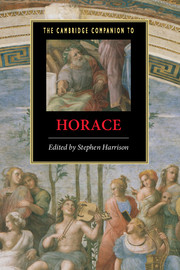Book contents
- Frontmatter
- Introduction
- Part 1: Orientations
- 1 Horace: life and chronology
- 2 Horatian self-representations
- 3 Horace and archaic Greek poetry
- 4 Horace and Hellenistic poetry
- 5 Horace and Roman literary history
- 6 Horace and Augustus
- Part 2: Poetic Genres
- Part 3: Poetic Themes
- Part 4: Receptions
- Dateline of works and major political events
- Works cited
- Index
3 - Horace and archaic Greek poetry
from Part 1: - Orientations
Published online by Cambridge University Press: 28 May 2007
- Frontmatter
- Introduction
- Part 1: Orientations
- 1 Horace: life and chronology
- 2 Horatian self-representations
- 3 Horace and archaic Greek poetry
- 4 Horace and Hellenistic poetry
- 5 Horace and Roman literary history
- 6 Horace and Augustus
- Part 2: Poetic Genres
- Part 3: Poetic Themes
- Part 4: Receptions
- Dateline of works and major political events
- Works cited
- Index
Summary
Introduction
Horace proclaims explicitly his use of Archilochus and Hipponax in the Epodes and of Alcaeus (seventh, sixth and sixth centuries bce respectively) in the Odes (Epodes 6.13-14, Odes 1.32, Epistles 1.19.23-33). But the relationship of these works to archaic Greek poetry is not easily grasped. They are less closely and pervasively engaged with that poetry than the recently published Eclogues are with Greek bucolic; and they discuss their relation to their 'models' less explicitly than the Satires do. Is broad difference from the Greek poets significant divergence, or a sign of their relative unimportance? Such questions are trickier because these poets mostly survive in fragments.
The primary aim here is not to compare archaic Greek poetry with Horace, as we perceive both, but to see what function the Greek poetry and ideas of it possess within the Horatian works. Points should be made on both source and target texts. The relevant Greek material is not just naked fragments in neat modern editions. Papyri show abundant metatexts to archaic poetry in circulation: commentaries, lives, treatises. Such works would hardly be ignored, as Horace’s evidence confirms, by someone planning to conquer a Greek genre. Scholia - with a marked interest in biography - frequently appear in the margins of lyric texts. Papyri and other material show us things no less essential than fragments: poets' lives, images, critical reputations, the placing of their poems in Hellenistic editions.
- Type
- Chapter
- Information
- The Cambridge Companion to Horace , pp. 36 - 49Publisher: Cambridge University PressPrint publication year: 2007
- 7
- Cited by

